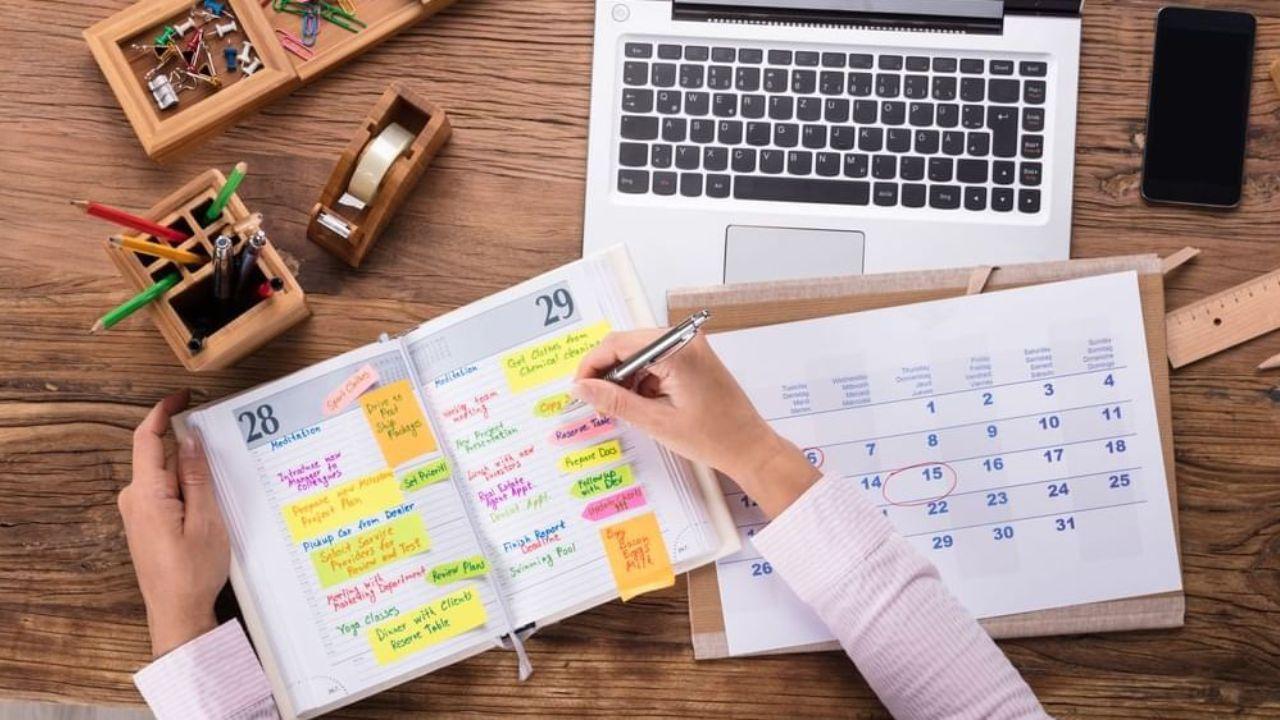
Post by: Zayd Kamal
Think of your study schedule as a superhero plan for school! A well-organized study schedule helps you balance homework, tests, and fun time.
Start by deciding what you want to achieve. Setting clear goals in your study schedule helps you focus on what’s important, like improving math grades or preparing for a science project.
Choose a regular study time that fits your day. Consistent study times help you stay on track and make learning a part of your daily routine.
Big tasks can feel overwhelming. Break them into smaller steps in your study schedule to make them more manageable and less stressful.
Make your study schedule colorful and exciting with stickers, charts, and markers. Fun tools can make following your schedule more enjoyable and motivate you to keep going.
Remember to add short breaks in your study schedule. Breaks help you recharge and stay focused, making your study time more effective.
Check your study schedule regularly and adjust it if needed. If something isn’t working, change it to fit your needs better.
Keep a positive attitude towards your study schedule. Celebrate your achievements and reward yourself for completing your study goals.
Don’t hesitate to ask for help from parents or teachers. They can offer tips and support to help you stick to your study schedule.
Find ways to make studying fun. An effective study schedule isn’t just about hard work; it’s about making learning an enjoyable adventure.

Start by figuring out what you want to achieve. Are you aiming to get better grades in math or finish a big science project? Setting clear goals helps you focus your study efforts.
Put your goals on paper or a digital note. Seeing your goals written down makes them feel real and keeps you motivated to work towards them.
Instead of vague goals like "do better in school," try specific ones like "complete my math homework every day" or "read one chapter of my science book each week." Clear goals make it easier to track your progress.
Divide your big goals into smaller, manageable tasks. For instance, if your goal is to ace a science test, break it into tasks like "review notes," "complete practice problems," and "ask for help with tricky topics."
Assign a deadline to each goal. For example, “Finish my reading assignment by Friday” or “Complete math practice problems by the end of the week.” Deadlines help you stay on track and manage your time effectively.
Regularly check how you’re doing with your goals. You can use a planner, calendar, or a goal-tracking app to see how much you’ve accomplished and what still needs attention.

Choose a study time that fits into your daily routine. Whether it’s right after school or before dinner, find a time when you feel alert and ready to learn. This helps make your study time more effective and enjoyable.
Try to schedule your study time when there are fewer distractions. For instance, studying right after school might be better than during your favorite TV show. This way, you can focus better and get more done.
Consistency is key! By choosing a regular study time each day, your brain gets used to focusing at that time. This regularity helps you build a strong study habit and makes learning a natural part of your day.
Ensure your study time doesn’t clash with your playtime or family activities. Balance is important, so your study schedule should fit comfortably around your other favorite activities. This keeps your day fun and balanced.
If you're unsure when you study best, try different study times to see what works for you. Maybe you learn better in the morning or after a short break. Experimenting helps you find your ideal study time.

Think about which subjects you need to focus on. For a balanced study schedule, include all your main subjects, like math, science, and language arts. This way, you cover everything and don’t miss out on any important topics.
Decide how much time you’ll spend on each subject. If math is tricky, you might need more time for it. For your study schedule, plan to spend extra time on subjects where you need more practice.
Break down your study schedule by days of the week. For example, Monday could be math day, and Tuesday could be for science. This keeps your study time organized and ensures you work on each subject regularly.
To keep things interesting, mix different subjects in your study schedule. Avoid studying the same subject for too long. A varied schedule helps keep your brain active and engaged.
For each subject, set clear goals. Instead of just saying “study math,” aim for something like “complete 20 math problems” or “read chapter 3 of the science book.” Specific goals make it easier to track your progress and stay motivated.

If you have a big project, like a science fair exhibit, break it into smaller parts. Instead of “do project,” list steps like “research topic” and “make a poster.” This makes the task easier to handle and helps you stay organized.
Create a checklist for each small task. Checking off items as you complete them makes you feel accomplished and shows your progress. It also keeps you on track with your study schedule.
Focus on one small goal at a time. If you need to read a book, divide it into chapters or pages to read each day. This way, you don’t get overwhelmed and can finish your reading on time.
Plan short breaks between tasks. For example, study math for 30 minutes, then take a 5-minute break. These breaks help you stay fresh and make studying more manageable.
Identify the most important tasks and tackle those first. If you have a big test coming up, spend more time on studying for it. This ensures you handle the most urgent tasks effectively.

Brighten up your study schedule with colorful markers. Using different colors for each subject helps you see what’s coming up and makes planning more fun.
Add stickers and create charts to track your progress. Each time you complete a task, place a sticker on your chart. It’s a fun way to see how much you’ve achieved!
Explore apps designed for learning and organization. Some apps offer games and quizzes that make studying interactive and enjoyable.
Use a notebook with cool designs to jot down your study goals and tasks. Decorate it with drawings or stickers to make your study time more engaging.
Set a fun timer for your study sessions. Choose a timer with cheerful sounds or visuals to make keeping track of time more enjoyable.
Decorate your study area with motivational quotes. Positive messages can boost your mood and keep you motivated while studying.

Breaks are like fuel for your brain! Including breaks in your study schedule helps your brain stay fresh and ready to learn more. Without breaks, studying can become tiring and less effective.
Plan for short breaks every 30-45 minutes. These mini-breaks keep your focus sharp and prevent you from getting bored. Use this time to stretch, grab a snack, or just relax.
During your breaks, do something you enjoy. Play a quick game, listen to music, or chat with a friend. Fun activities during breaks make studying more enjoyable and give you a chance to unwind.
Use breaks to move around. A quick walk or some stretching can help refresh your mind and body. Staying active during breaks keeps your energy up and helps you stay focused when you return to studying.
Treat yourself after completing a study session. A small reward, like extra playtime or a favorite treat, makes your study schedule more motivating. Breaks become even more exciting when you know there's a fun reward waiting

Regularly review your study schedule to see how well you’re doing. Checking in helps you see what’s working and what might need a change.
If you find certain subjects are taking more time or need extra attention, adjust your study schedule accordingly. Flexibility ensures that you’re always on track and not overwhelmed.
As you make progress, update your study goals to match your new needs. This keeps your study schedule relevant and helps you stay focused on what’s important.
Make sure you’re not spending too much time on one subject. Adjust your schedule to balance your study time across different subjects for a well-rounded approach.
Ask for feedback from teachers, parents, or friends about your study habits. Their suggestions can help you fine-tune your study schedule for better results.

Staying positive helps you see the good side of things. When you think positively, you find it easier to handle challenges and stay motivated.
Replace negative thoughts with happy ones. Instead of saying “I can’t do this,” try saying “I’m learning and improving every day.”
Recognize and celebrate your small successes. Each step forward is an achievement and staying positive means appreciating these little victories.
Be your own cheerleader. Remind yourself of your strengths and how far you’ve come. Positive self-talk boosts your confidence and keeps you focused.
Spend time with friends and family who uplift and support you. Being around positive people makes it easier to stay positive yourself.
Keep your goals in mind and remember why you started. Staying positive means focusing on your dreams and pushing through tough times.
Approach tasks and challenges with excitement. Finding fun in what you do makes it easier to stay positive and engaged.
Take a moment each day to think about what you’re grateful for. Focusing on the good things in your life helps maintain a positive outlook.

When you need it, don’t hesitate to ask for support. Whether it's a teacher, parent, or friend, getting help can make studying easier and more fun.
Your teachers are there to help you succeed. If you’re struggling with something, let them know. They can provide extra resources or tips to improve your understanding.
Learning with friends can make studying more enjoyable. Form a study group where you can share ideas and support each other in understanding different topics.
There are many helpful online tools and educational websites. They can offer extra practice and explanations to support your learning.
Your family can be a big part of your study success. They can help set up a study schedule, provide a quiet place to work, or offer encouragement when needed.
Joining a study group or club at school can give you a sense of community and make learning more engaging. You can get different perspectives and help each other out.

Embrace the idea that learning can be an exciting adventure. When you enjoy the process of learning, you make every study session more enjoyable and interesting.
Every time you achieve a small goal, celebrate it! Recognize your progress and enjoy the feeling of accomplishment. It makes the learning process more rewarding.
Turn your study sessions into a fun activity by using colorful markers, stickers, and charts. Fun tools can make the process of learning more engaging and less like a chore.
Keep your study routine fresh by changing up your subjects or how you study. A variety of activities can make the learning process more dynamic and exciting.
Don’t forget to include short breaks in your study schedule. Breaks help you stay refreshed and make the process of studying feel less tiring.
See challenges as opportunities to learn and grow. The more you enjoy overcoming obstacles, the more fun the learning process becomes.
Creating an effective study schedule can turn learning into an exciting and manageable experience. Start by crafting a super study plan that balances homework, tests, and fun time. Set clear goals to focus your efforts, like improving math grades or preparing for a science project. Pick a regular study time that fits your daily routine and helps you stay consistent. Break down big tasks into smaller steps to make them less overwhelming. Use fun tools like colorful markers and stickers to make studying enjoyable. Remember to include short breaks to recharge your brain and stay focused. Regularly review and adjust your schedule to stay on track. Maintain a positive attitude and celebrate small wins to keep yourself motivated. Don’t hesitate to get support from teachers, friends, or family to help you stick to your study plan. Most importantly, enjoy the process of learning by finding joy in your study routine and celebrating your progress.
The content provided by DXB News Network is intended for informational purposes only. The suggestions and tips for creating an effective study schedule are general and may not apply to every individual’s needs. Always consult with educational professionals for personalized advice tailored to your specific situation. DXB News Network is not responsible for any outcomes resulting from following the advice presented in this article.
Begin by setting clear goals and understanding what you want to achieve. Create a study plan that outlines your daily and weekly study times, ensuring you include all subjects and break tasks into manageable steps.
Pick a time when you feel most alert and focused. Consistency is key, so try to stick to the same study time each day. Avoid times when you’re likely to be distracted, such as during your favorite TV shows.
Divide large tasks into smaller, manageable steps. For instance, if you have a big project, break it down into specific actions like research, drafting, and finalizing. Use checklists to track progress.
Use colorful markers, stickers, and charts to make your study plan visually appealing. Incorporate fun activities and tools to keep you motivated and make studying less monotonous.
Breaks help you recharge and prevent burnout. Short breaks between study sessions keep your mind fresh and improve overall productivity. Use this time for a quick walk or a fun activity to stay energized.
#trending #latest #StudySchedule #StudyTips #EffectiveStudy #StudyPlan #LearningJourney #StudentSuccess #StudyGoals #TimeManagement #AcademicSuccess #StudyRoutine #OrganizedLearning #StudyBreaks #HomeworkHelp #StudySkills #EducationTips #StudyStrategy #StudentLife #FocusAndAchieve #LearningMadeFun #SmartStudying #breakingnews #worldnews #headlines #topstories #globalUpdate #dxbnewsnetwork #dxbnews #dxbdnn #dxbnewsnetworkdnn #bestnewschanneldubai #bestnewschannelUAE #bestnewschannelabudhabi #bestnewschannelajman #bestnewschannelofdubai #popularnewschanneldubai

Vikrant Karyakarte: The Artist Who Paints the Rhythm of Life....Read More.

PM Modi will visit Jeddah to meet Crown Prince MBS. Talks will cover strong ties, strategy, and new MoUs. This is his first visit in his third term....Read More.














Humanoid Robots Race with Humans at Half-Marathon in China
21 humanoid robots raced alongside runners in the Yizhuang half-marathon, showcasing robotic enginee

Woman Brain-Dead After Paris Cryotherapy Accident
A woman is brain-dead after a fatal cryotherapy accident in Paris that also claimed a gym worker’s l

A Chinar Leaf in the Desert: Zubair Kirmani and the Journey of Kashmir at World Art Dubai
A Chinar Leaf in the Desert: Zubair Kirmani and the Journey of Kashmir at World Art Dubai

Carla Gía Brings the Language of Duality to World Art Dubai 2025
Carla Gía Brings the Language of Duality to World Art Dubai 2025

Not Just a Painting, It’s a Pulse: Deena Radhi at World Art Dubai 2025
Not Just a Painting, It’s a Pulse: Deena Radhi at World Art Dubai 2025